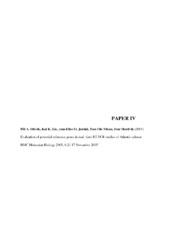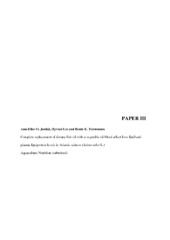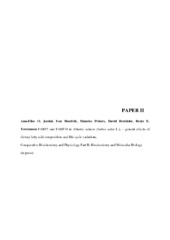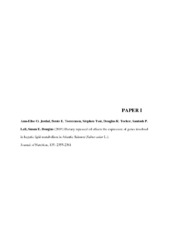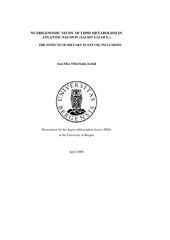| dc.contributor.author | Jordal, Ann-Elise Olderbakk | eng |
| dc.date.accessioned | 2006-09-28T12:33:49Z | |
| dc.date.available | 2006-09-28T12:33:49Z | |
| dc.date.issued | 2006-09-08 | eng |
| dc.identifier.isbn | 82-308-0220-3 (print version) | en_US |
| dc.identifier.uri | http://hdl.handle.net/1956/1883 | |
| dc.description.abstract | The two dietary trials conducted in the present study (Papers I-III) used dietary rapeseed oil fed in a regression design and a full plant oil blend replacement for fish oil, respectively. The metabolic response of Atlantic salmon was examined in relation to gene expression (Paper I-III), lipid storage (Paper II and III) and fatty acid oxidation (Paper II). Furthermore, intracellular fatty acid uptake and transport (Paper II) and lipoprotein metabolism (Paper III) was studied. In order to examine gene expression of lipid metabolic genes thorough technical validation and quality control of microarray studies (Paper I) and evaluation of reference genes for Q-PCR were prioritised (Paper IV). Dietary rapeseed oil induced D5 fatty acid desaturase mRNA expression (Paper I), and lipogenic enzyme activities were partially increased for Atlantic salmon fed high dietary inclusion of plant oils (Paper III). Dietary long term partial rapeseed oil inclusion resulted in reduced expression of several mitochondrial transport proteins, transcription factors, co-activators and signal transducers (Paper I). The expression of these proteins is known to be indirectly influenced by dietary fatty acids mediated through changes in membranes phospholipids compositions. Partial dietary rapeseed oil inclusion had no impact on FABP3 or FABP10 gene expression in Atlantic salmon liver or muscle tissues (Paper II). Nonetheless, a tendency for decreased FABP3 protein expression with decreasing inclusion of dietary rapeseed oil was observed. Overall, liver and muscle tissues of Atlantic salmon seem to express several FABPs, possibly linked to different metabolic functions. Relative FABP3 mRNA levels dominated in both red and white muscle tissues. Red muscle appeared to express higher levels of FABP3 than white muscle and heart. Liver FABP10 mRNA appeared to be expressed at high levels compared to liver FABP3. Modest changes in liver and muscle FABPs mRNA levels between different life stages were observed. Liver TAG stores, plasma lipid and LDL levels were significantly affected by dietary plant oil replacement in Atlantic salmon during a long term feeding experiment (Paper III). Current results indicate that high dietary plant oil inclusion increase liver TAG stores and decrease plasma lipid levels possibly through decreased VLDL synthesis. The expression of liver PPARγ increased prior to seawater transfer followed by a decrease, and then another increase towards the final sampling (22 months) which was correlated with increased liver TAG stores. mRNA expression of Atlantic salmon apolipoproteins seem to be regulated by dietary fatty acids (Paper I). Yet complex post translational mechanisms for lipoprotein assembly are believed to occur in Atlantic salmon as in mammals (Paper I and III). Through thorough evaluation of potential systemic and technical variation (Paper I and IV), the experimental design chosen enabled us to measure dietary and lifecycle gene expression variations in a system showing extrinsic and intrinsic variability (Paper I- III). | en_US |
| dc.format.extent | 1154840 bytes | eng |
| dc.format.extent | 135879 bytes | eng |
| dc.format.extent | 1794757 bytes | eng |
| dc.format.extent | 432903 bytes | eng |
| dc.format.extent | 911801 bytes | eng |
| dc.format.mimetype | application/pdf | eng |
| dc.format.mimetype | application/pdf | eng |
| dc.format.mimetype | application/pdf | eng |
| dc.format.mimetype | application/pdf | eng |
| dc.format.mimetype | application/pdf | eng |
| dc.language.iso | eng | eng |
| dc.publisher | The University of Bergen | en_US |
| dc.publisher | Nasjonalt institutt for ernærings- og sjømatforskning (NIFES) | en_US |
| dc.relation.haspart | Paper 1: Repoduced from Journal of Nutrition, 135, Ann-Elise O. Jordal, Bente E. Torstensen, Stephen Tsoi, Douglas R. Tocher, Santosh P.Lall, Susan E. Douglas, Dietary rapeseed oil affects the expression of genes involvedin hepatic lipid metabolism in Atlantic Salmon (Salmo salar L.), 2005, pp. 2355-2361. Copyright The American Society for Nutrition. | en_US |
| dc.relation.haspart | Paper 2: Reproduced from Comparative Biochemistry and Physiology Part B: Biochemistry and Molecular Biology, Volume 145, Ann-Elise O. Jordal, Ivar Hordvik, Maurice Pelsers, David Bernlohr, Bente E.Torstensen, FABP3 and FABP10 in Atlantic salmon (Salmo salar L.), – general effects ofdietary fatty acid composition, and life cycle variations, October 2006, pp 147-158, Copyright Elsevier. <a href="http://dx.doi.org/10.1016/j.cbpb.2006.05.007"target="blank"> http://dx.doi.org/10.1016/j.cbpb.2006.05.007</a> | en_US |
| dc.relation.haspart | Paper 3: Aquaculture Nutrition, Ann-Elise O. Jordal, Øyvind Lie and Bente E. Torstensen, Complete replacement of dietary fish oil with a vegetable oil blend affect liver lipid andplasma lipoprotein levels in Atlantic salmon (Salmo salar L.), (submitted). | en_US |
| dc.relation.haspart | Paper 4: Reproduced from BMC Molecular Biology 2005, 6:21, Pål A. Olsvik, Kai K. Lie, Ann-Elise O. Jordal, Tom Ole Nilsen, Ivar Hordvik, Evaluation of potential reference genes in real- time RT-PCR studies of Atlantic salmon, 17 November 2005 , Olsvik et al; licensee BioMed Central Ltd. <a href="http://dx.doi.org/10.1186/1471-2199-6-21”target="blank"> http://dx.doi.org/10.1186/1471-2199-6-21</a> | en_US |
| dc.title | Nutrigenomic study of lipid metabolism in Atlantic salmon (Salmo salar L.) : the effects of dietary plant oil inclusion | en_US |
| dc.type | Doctoral thesis | |
| dc.subject.nsi | VDP::Matematikk og Naturvitenskap: 400::Zoologiske og botaniske fag: 480::Marinbiologi: 497 | nob |
| dc.subject.nsi | VDP::Matematikk og Naturvitenskap: 400::Basale biofag: 470 | nob |
